When was the last time you saw a unicorn? You can tell this is one masquerading as a horse, if you look closely at her shadow.
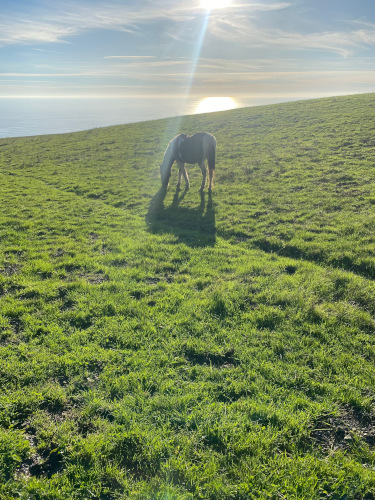
I come from a world of stories.
I have sailed across a sea of words
to ask if you will come away with me.
—Oliver Jeffers, A Child of Books
It’s been a long time since I’ve seen a unicorn—an auspicious sign for anyone inspired to embark upon something new. Are you, too, inspired to do something new? The twisted spire goes into your heart and makes you come alive.
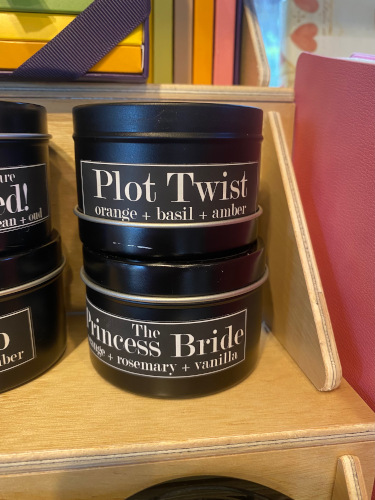
This one is very well disguised. Here she is up close. You’d never guess, would you?

Well, most people wouldn’t guess, but we’re not most people.
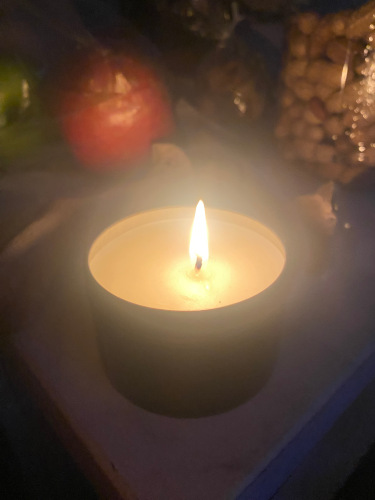
We are in a fairytale.

“It’s feeling more like a tail perhaps. It Belongs again, if you know what I mean.”
—Eeyore, in A. A. Milne's Winnie-the-Pooh
There’s something to be said for being of a feather.

Here comes hope!
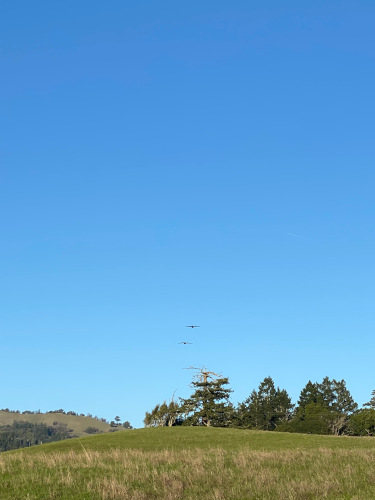
“Hope” is the thing with feathers—
That perches in the soul—
And sings the tune without the words—
And never stops—at all—
—Emily Dickinson

Closer.
We’ll follow them toward the edge of the Great Expanse. Hope, like smoke, follows beauty.
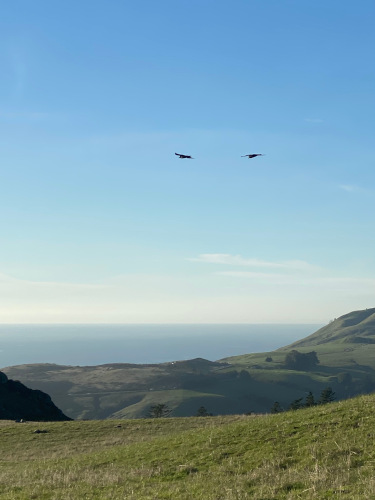
A watcher stands guard.
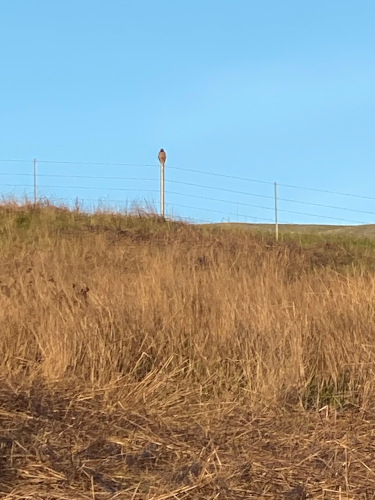
Two watchers stand guard.
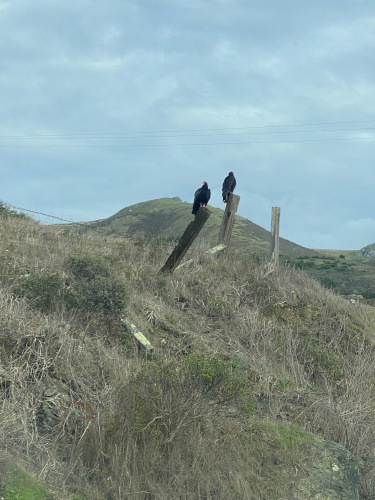
Watchers are everywhere, guiding us wordlessly.
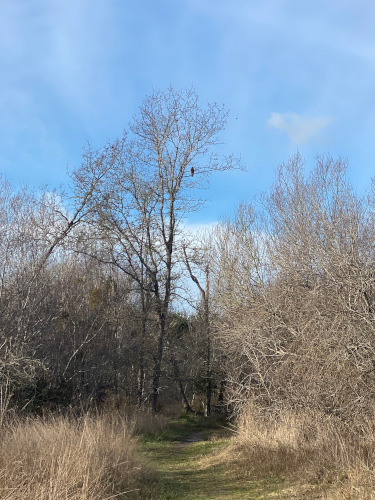
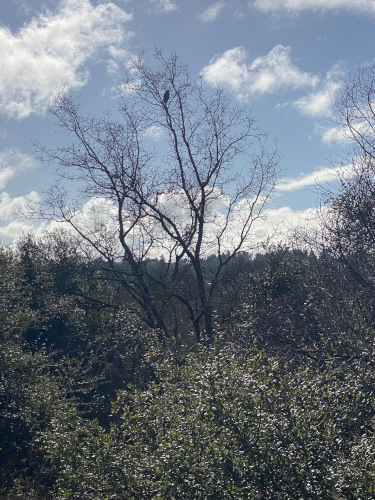
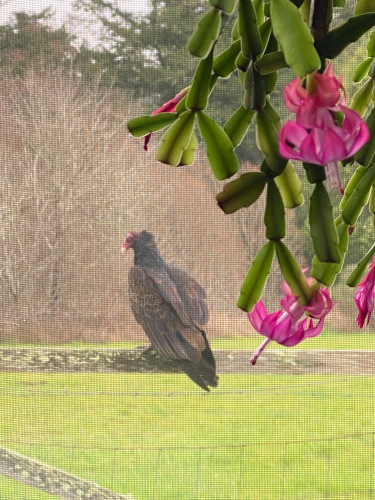
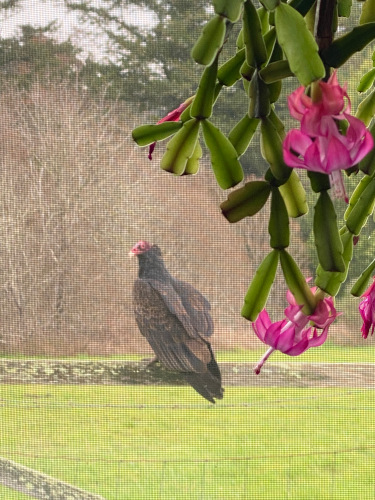
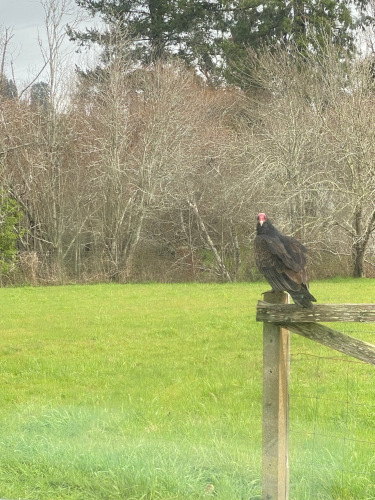
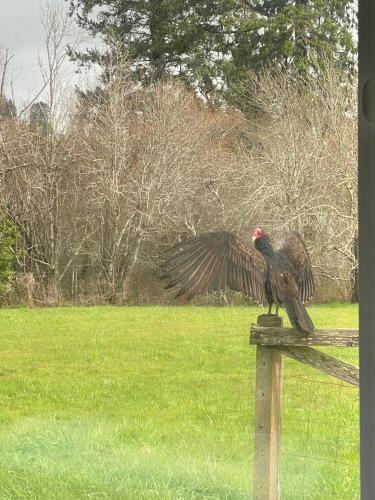
And all around these impulsive life decisions dance little corrective serendipities that nudge me, this way and that, along the course of my life.
I once felt the path of existence was entirely random and unplanned, but now I am not so sure. At this stage in my life I feel these contingent decisions are amounting to something, that destiny is at work and, as the pieces fall mysteriously into place, that there is some sort of ultimate meaning. Life appears not random at all but part of a superior system, where the sum of these intuitions have an order, a greater purpose, an eventual orientation beyond what we ourselves can perceive. Even in the whorl of our own personal tragedies, when the cosmos appears at its most chaotic and impartial, I have come to see the world, in its complexity, rearranging itself toward meaning.
—Nick Cave, The Red Hand Files Issue #269
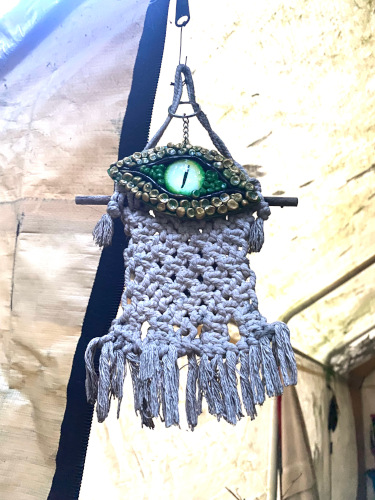
Sometimes you learn that joy and terror are very close together. Sometimes you learn they fire at the same time, joy and fear and death and being alive, your stupid little cells illuminated from the inside like stained glass windows.
—Cat Hicks, “Covid Data Log”
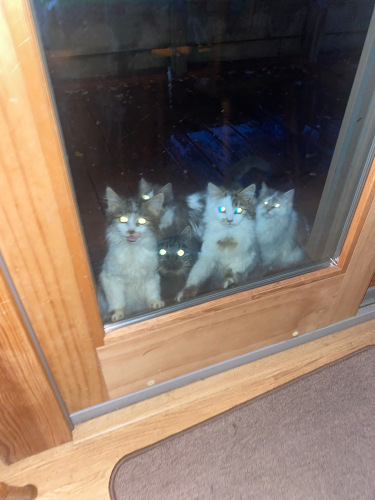
Should Wilde, a man who enjoyed living off the grid, a man who really couldn’t connect to most people, open the door . . . ?
—Harlan Coben, The Boy from the Woods
Watchers are not as scary as they might seem—and in facing fears, there’s growth.
My Grandma Faye was sitting beside me, humming a lullaby in a rocking chair made of moonlight that she’d brought with her from the afterlife. “All news is good news,” she whispered. “You’ll understand someday. . . .”
This I now know for certain: I do all of my growing during the times in my life when I am offering compassion to the parts of myself that have not yet grown. I have never once managed to shame myself into a version of me I loved more (and trust me, I spent decades trying). As Meg says, “Shame is never fertile soil for growth.” A better world is not created from a planet of people hating themselves, but hate’s opposite.
—Andrea Gibson, “How Did I Change So Much, So Quickly?”
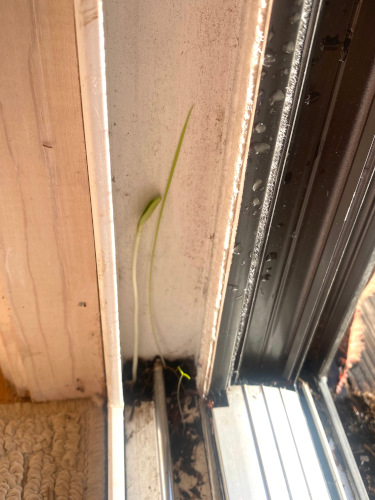
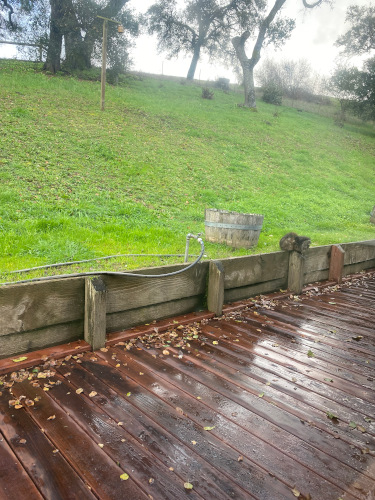
. . . His fearful reluctance crystallizes into curiosity, which finally melts into a warm wonderment . . . .
—Maria Popova, “A Child of Books: An Illustrated Love Letter to the Wondrous World of Words and Stories”
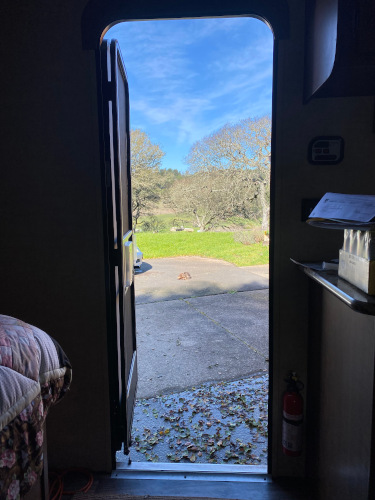
Loved by a person, loved by a plant, loved by a pet or a drunk or an aunt.
—Amanda Palmer, “I Am the Dr. Seuss of Love”
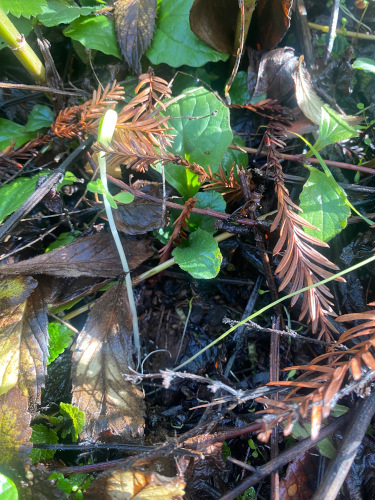
I am in the grass. On dry land. Safe. Held. Okay.
—Amanda Palmer, “ ‘NEW ZEALAND SURVIVAL SONGS’ Is OUT NOW”
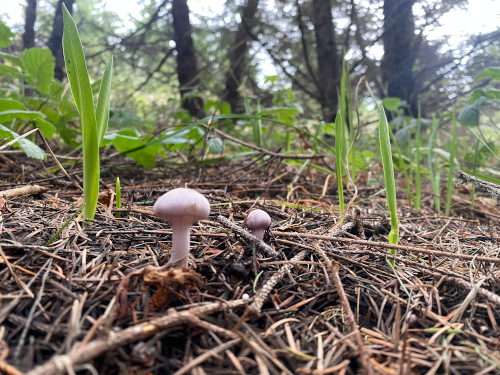
Sometimes we get things that we never could have imagined or deserved: broken cells, small loyal dogs, the strange aid of the prevalence of masks in science fiction, death wishes from strangers on the street, the knowledge that being loved by one person can’t fix you but it can still save you.
—Cat Hicks, “Covid Data Log”
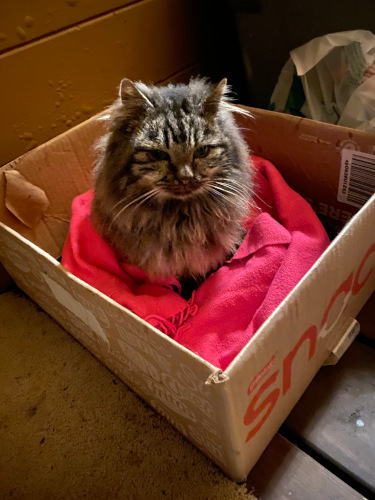
One day, looking around the ramshackle goat-house that is now his home, filled with books and wind, filled with a man’s paintings and a child’s love, Kent observes: “I don’t see why people need better homes than this.”
—Maria Popova, “Wilderness, Solitude, and Creativity”
It all keeps coming to a T.
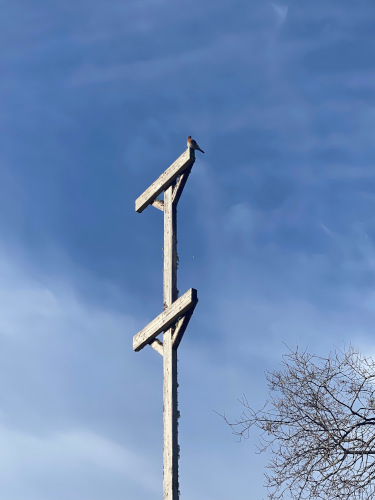
A bluebird’s call echoes.

I said “goodbye” to those people who wanted me to succeed only in monetary and materialistic terms. I began traveling alone, finding solace and joy in my small cabin in the Yukon wilderness, a place far from judgments, where I could focus on joy, hope, healing, and spreading these values.
—Gurdeep Pandher, “True Joy Is Real Wealth, Not Those Fluctuating Numbers”
The time has come to go a new way, beyond the crossings of T’s—beyond all that is known.
In an unpublished paper from around 1961, Gödel asserts that “materialism is inclined to regard the world as an unordered and therefore meaningless heap of atoms.” . . . Despite living in a materialist age, Gödel was convinced that materialism was false, and thought further that his incompleteness theorems showed it to be highly unlikely. . . . Through his proof, he established by mathematically unquestionable standards that mathematics itself is infinite and new discoveries will always be possible. It is this result that shook the mathematical community to its core.
—Alexander T. Englert, “We’ll Meet Again”

Here, it’s okay—even thrilling—to crash, again and again.
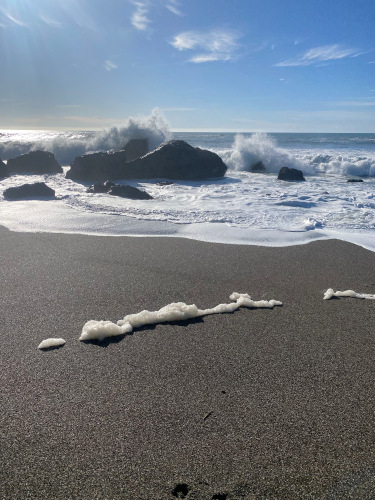
Maybe you were laid off, or a relationship fell apart. Maybe a product didn’t work, or a conversation didn’t go well, or an idea didn’t land. You had a hypothesis. Something else happened instead. Now you’re in uncharted territory, learning the things you didn’t set out to learn—but those may be the best lessons of them all.
—Jason Feifer, “What If Every Failure Is Just An ‘Accidental Experiment?’ ”
Steps that seem to lead nowhere whisper of where we need to be.
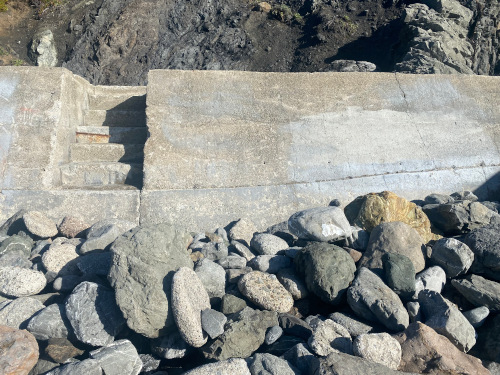
I am a stone worn down into a peculiar shape by millennia of erosion, with no specific purpose, and which can only be held and appreciated by a curious hand. I only seem defective in a world that picks up all the earth’s wonders and asks what it’s a tool for. I am not for anything. I just am. And so are all humans, and all living things on earth.
. . . Life will always exist. No matter how much we try to banish its chaos with Round Up and Lysol and bulldozers and microplastics and overprescribed antibiotics, living beings continue to creep into all the small gaps and sharp corners that capitalism has tried to erect.
—Devon Price, “My Disability Is Manufactured”
The steps stretch and recede.
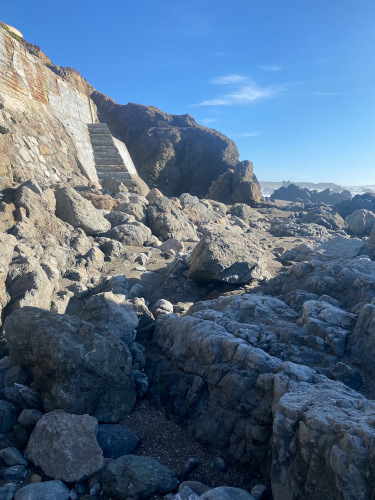
They playfully draw nearer—or do they?
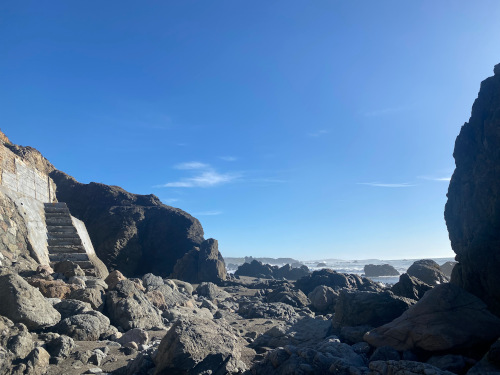
A stone is turned.
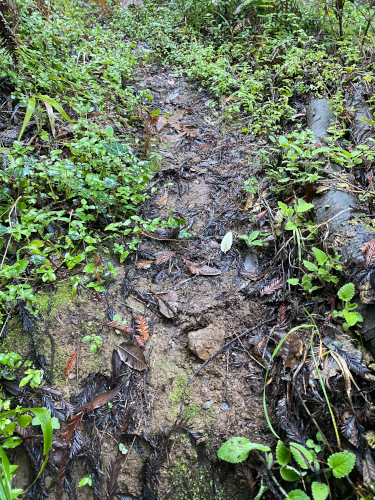
Reality ripples.

The time has to be right; one has to be, by chance or intention, upon the border of two worlds. And sometimes these two borders may shift or interpenetrate and one sees the miraculous.
—Loren Eiseley, “The Judgment of the Birds”
Worlds are within worlds.
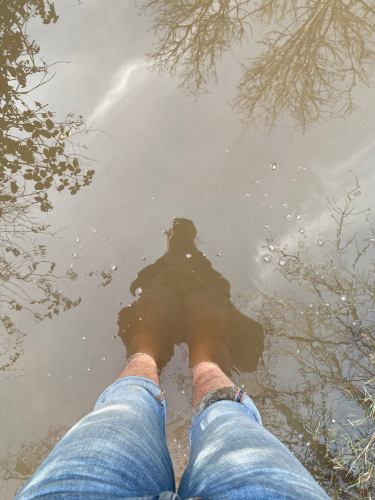
Down is up.
Up is sideways.
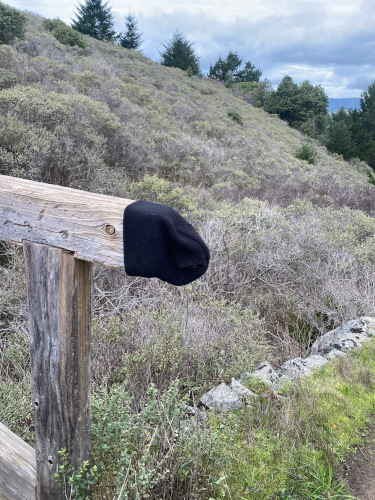
As he drifted down into the bone-chilling murk, his mind bifurcated. “One me was floating high above and could see everything: the sinking plane, the raft, people swimming. The other me was underwater. The above-me knew the below-me didn’t know the above-me existed. The above-me was giving instructions to the below-me in the form of a low voice in my head . . . .”
—Eric Lindner, Tiger in the Sea
Here’s a piece of a world right now.
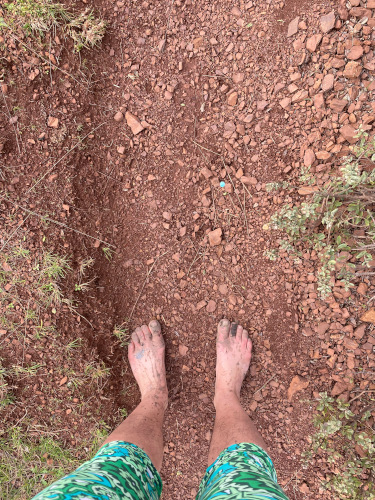
A blue thing that is two things.
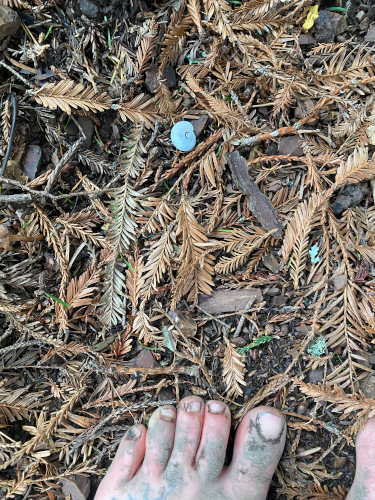
Let’s go in!

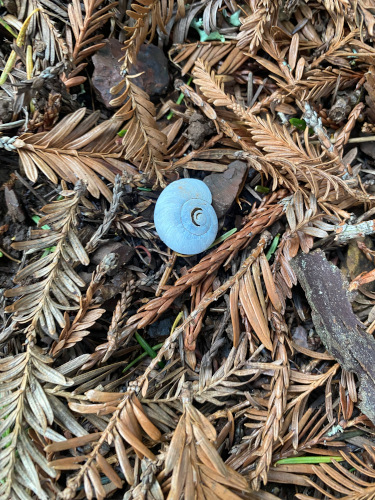
Wait: we’ll need to fuel up first—and we’re nowhere near a 7-Eleven.
Nothing changes at a 7-Eleven. Time flows forward everywhere except in a 7-Eleven.
—Harlan Coben, The Boy from the Woods
We are flowing forward. Fortunately, watchers feed each other (in different ways).
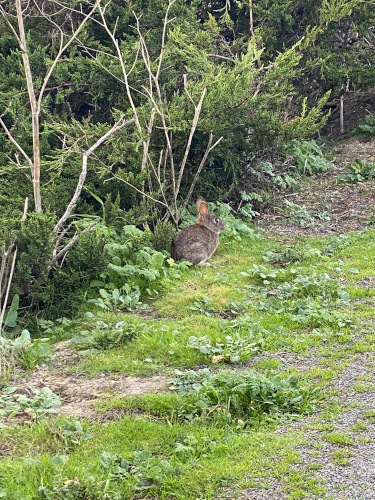
Yet Murray refused to fall prey to the crutch of convention or “the fallacy of decisive action.” To his way of thinking, when it seemed like there was no time to think was just when pausing to think was most essential. It was counterintuitive, like steering into a skid.
—Eric Lindner, Tiger in the Sea
It’s not always about taking action right away.
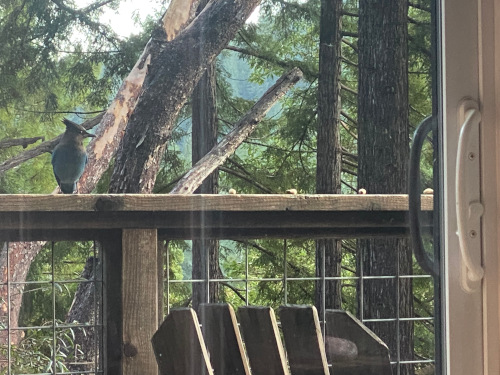
Sometimes you pause a moment in appreciation or to make sure it’s right to take.
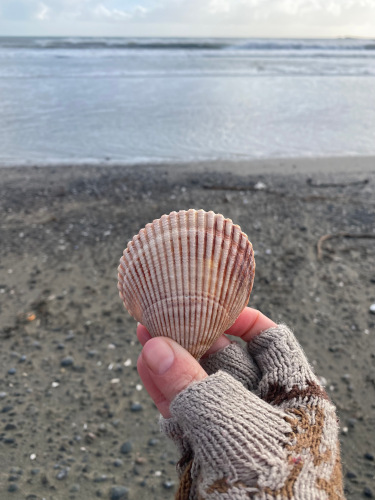
The day is waning.
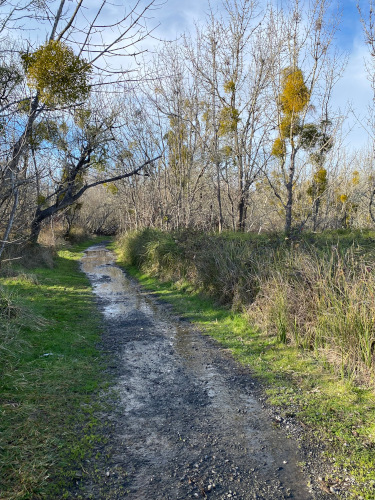
Articles and essays about mycoheterophic plants and Ghost Pipe usually say the plants “fool” the fungus or “steal” the sugar. . . .
We immediately characterize the Ghost Pipe as lazy or as a villain. . . .
But what if you can’t walk? What if you can’t bathe yourself or feed yourself? This isn’t a hypothetical to me. This is a lived experience. What does it feel like to know you are alive only because other people have nourished and cared for your body? . . .
Although it can’t be “weighed,” it feels good to help those that we love. It feels good to feel needed. Could the fungi, in some strange way, enjoy this relationship? Is there interstitial play between these two beings? . . .
My totally unsubstantiated feeling is that we are looking at mycoheterotrophs on a human scale. . . .
My deep intuition is that there is something invisible, and as of yet undocumented, happening between these two beings.
—Sophie Strand, “Ghost Pipe, Illness, and Mycoheterotrophy”
Let’s keep going. We have wetlands yet to wade, and a deepening portal to pass through.
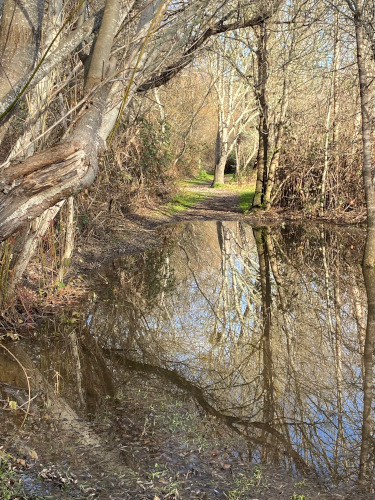
At times it seems as if the portal never comes any nearer. It hovers ahead, ominous or inviting.
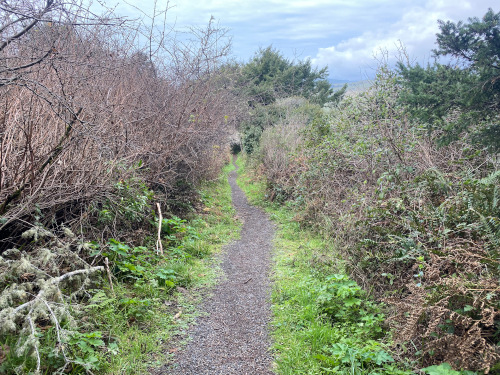
Yet Dives himself, he too lives like a Czar in an ice palace made of frozen sighs . . . .
—Herman Melville, Moby-Dick
Suddenly we are in it.
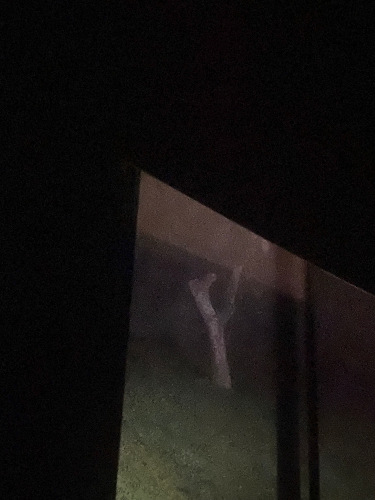
We grievers know, Mark. . . . We understand the sense of having nowhere to rest our minds that is not full of the darkest treachery. We know what it’s like to be confronted with the impossibility of a future life and the feeling that things will never be bearable again. . . .
But I want to say something, and even though it will doubtless mean little to you at this moment, I hope in time you will look back and know I spoke a kind of truth. Some years have now passed since the loss of my own sons, and though gone from this world, I have come to understand that they still travel with me—they are with me now—but more than that, they have become the active participants in a slow but certain awakening of the spirit. It saddens me deeply that they never lived their own full lives, but though I would give anything to have them back, these departed souls ultimately served as a kind of saving force that revealed the world to Susie and me as a thing of outrageous beauty. I have found my relationship to the world enriched in a way that I never dreamed possible. I know this to be true, but I also know it is a truth beyond understanding in your time of fresh grief, and so I say these things with extreme caution and pray it doesn’t come across as a kind of glibness uttered into your despair.
It seems like Murray was a beautiful young man, a sensitive and vital being, and these are the saddest and most hopeless days you will experience, but I want you and your family to know this—if you can just hold together, I believe that life will get better for you, in ways you cannot yet comprehend. One day you will find Murray travelling with you, not just as a grief or a memory, but as an animating and guiding principle, allowing you to experience joy in a way you have never experienced it before. Be kind and patient and gentle and merciful with one another. Stay close. Hold firm. Forgive. Grief prepares the way. Joy will in time find you. It is searching for you, in the impossible darkness, even now.
—Nick Cave, The Red Hand Files Issue #270
In breaking, we free pent-up floodwaters.
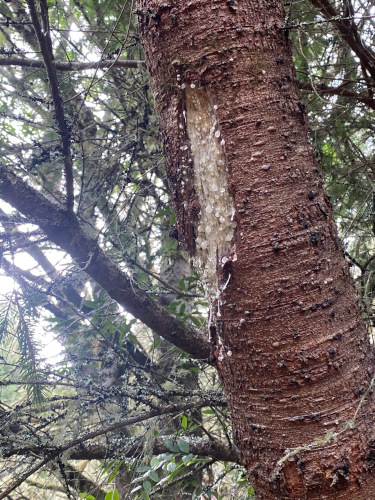
A book must be the axe for the frozen sea inside us.
—Franz Kafka
The waters light the way.
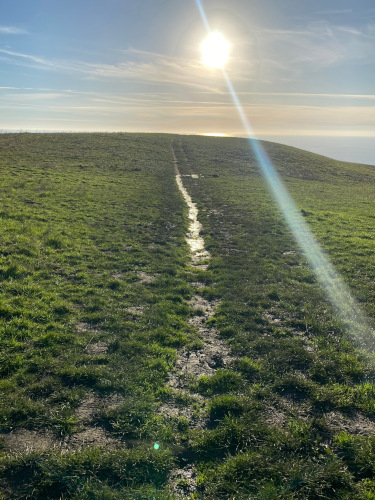
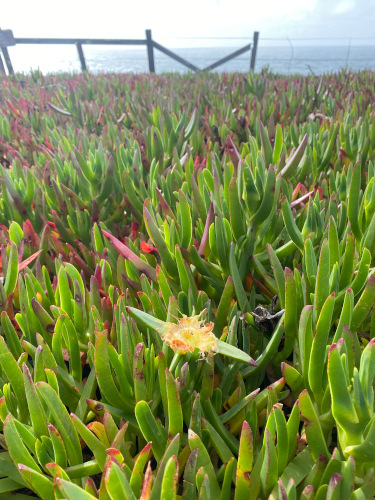
I am bound, I am bound, for a distant shore
By a lonely isle, by a far Azore,
—Henry David Thoreau
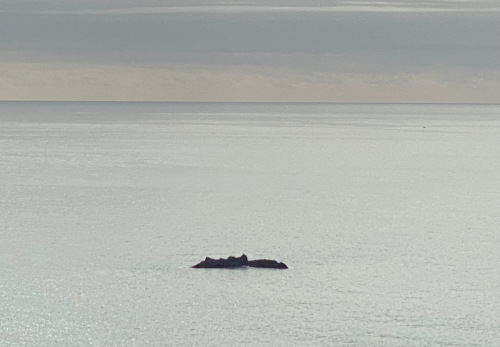
There it is, there it is, the treasure I seek,
On the barren sands of a desolate creek
—Henry David Thoreau
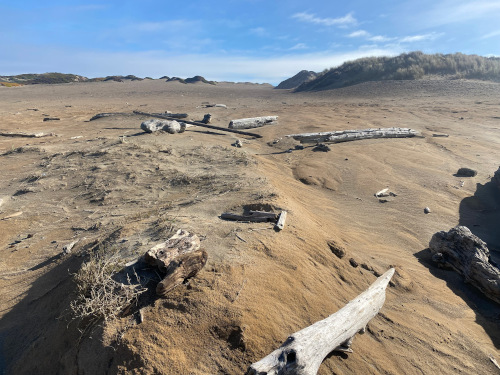
But alone in distant woods or fields, I come to myself, I once more feel myself grandly related, and that cold and solitude are friends of mine.
—Henry David Thoreau
Something starts to shift—something unexpected, to arise.
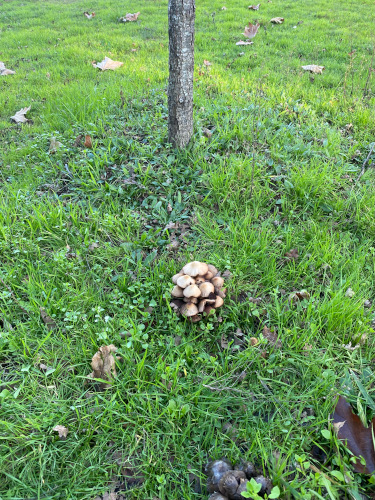
I am grateful in a way that is wide and deep and low. I hope you can feel some sonorous note of it—the hum and grind of ice relaxing under the sun—in your body.
—Sophie Strand, “Ghost Pipe, Illness, and Mycoheterotrophy”
There—our people are waiting for us.
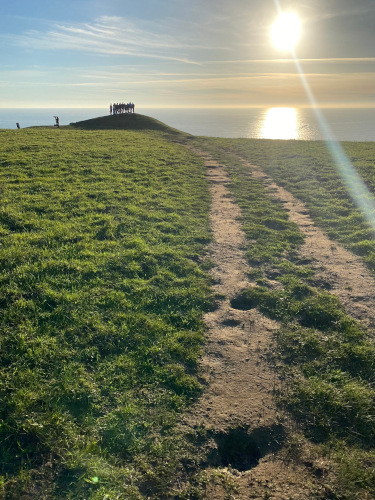
Get ready to join the jig of merry mushrooms who spread their gills to sing, and listen for the echoes of fairy laughter drifting between the trees.
The ring is nearly open. . . . Enchantment awaits.
—Sea Witch Botanicals (my favorite incense-makers), announcing the Fae Ring incense to their mailing list
Transmutation springs up from the darkness beneath our feet.
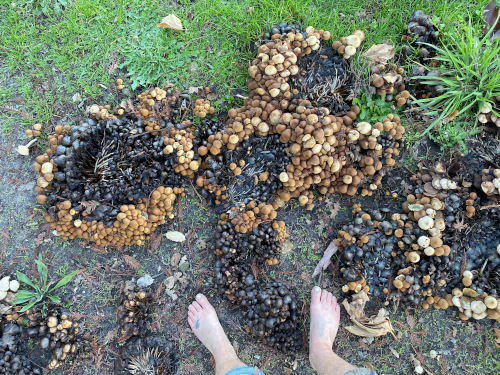
Deep magic abounds in frothy little bits of undeniable joy.
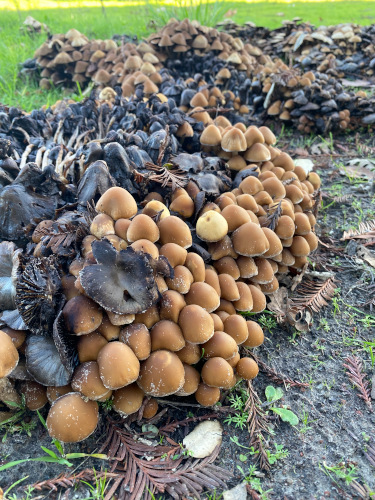
Joy as armour. Love as shelter. I don’t know. I hope so.
—Nick Cave, The Red Hand Files Issue #271
It effervesces.
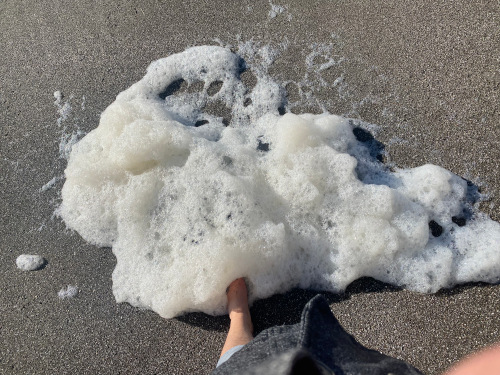
Even in the darkness that lies beneath, a point of light shines.
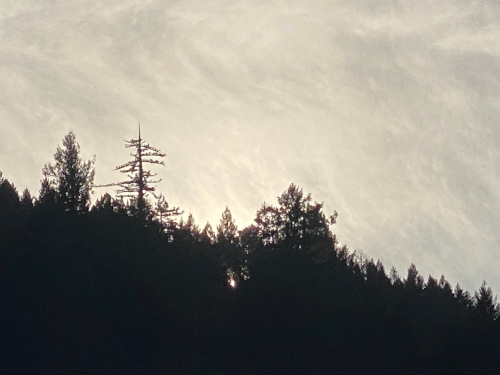
I know, it says.
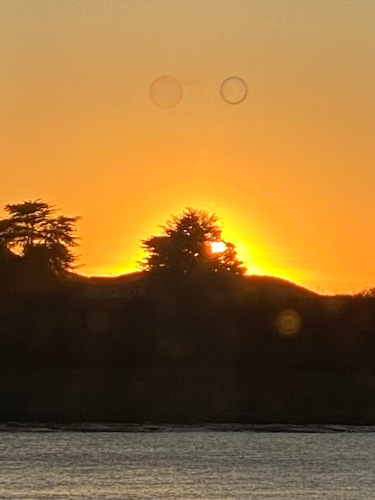
I know.
The night is beautiful beyond thought. All the bay is flooded with moonlight and in that pale glow the snowy mountains appear whiter than snow itself. The full moon is almost straight above us, and shining through the tree tops into our clearing makes the old stumps quite lovely with its quiet light. And the forest around is as black as the abyss.
—Rockwell Kent, Wilderness
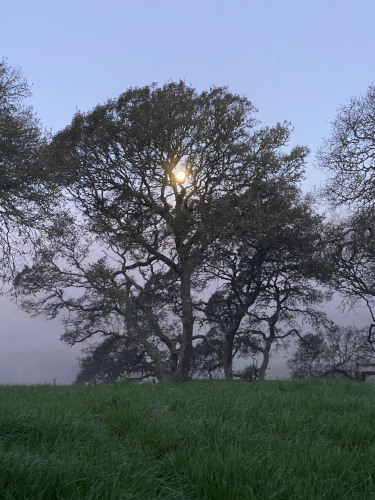
The light of understanding seems so close now.
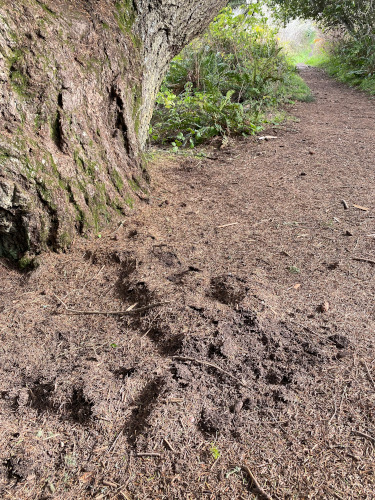
The reality is that you will grieve forever. You will not “get over” the loss of a loved one; you will learn to live with it. You will heal and you will rebuild yourself around the loss you have suffered. You will be whole again but you will never be the same. Nor should you be the same nor would you want to.
—Elizabeth Kübler-Ross
At last, almost without fanfare, we pass through.
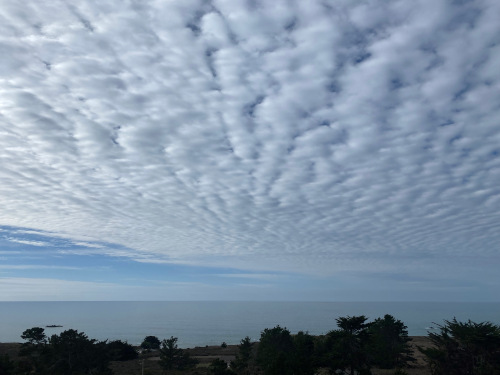
The pain never leaves me, but the stories, and what they mean, and where they will take me, are starting to make more and more sense. . . .
—Amanda Palmer, “The State of All Things: January 2024”
A high place of windswept peace is laid out for us.
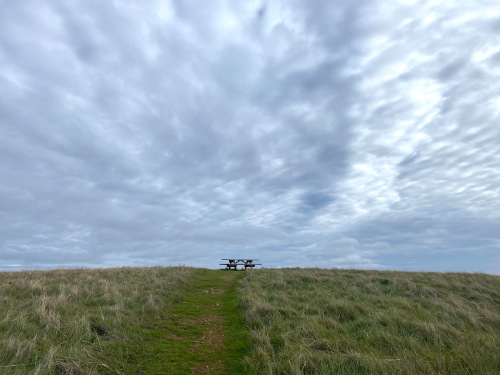
We get the green light.
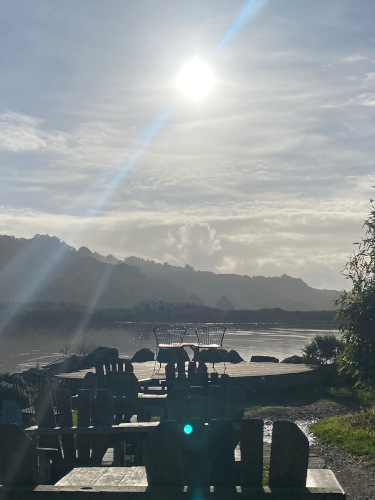
A wish is granted.

We find our love again.

Now another woman has come into my life and for reasons that are mysterious and remote she has looked at all of this and said, “I would like to be with him.” She listens to me quietly as I evacuate my heart and with tender patience draws me close and tells me she will be the one who will not go. She too has memories of a childhood lived in pain, and hers have made her compassionate and free. And now when I reach out in the night I am reaching for her, for the creature that she is, with her wise sad face and her kindness, her grace. Perhaps now there is something to look forward to. Perhaps it is time to realize that this is good enough. Perhaps I have found myself at last on the other side of the rock, the side protected from the wind, and at last life’s depravations will blow harmlessly over my head and spin out over the plains where they can do no harm, and leave me alone. She is the rock.
—Freddie deBoer, “the lee of the stone”
Let’s rest in love for a moment.
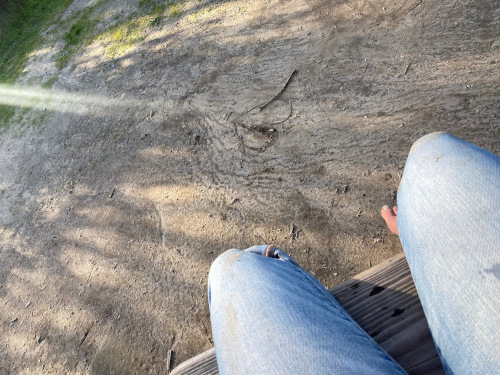
This story started when I heard her laughing. I didn’t know why she laughed then, but I’m starting, finally, to understand what was so damn funny.
—Rhyd Wildermuth, “Worlding into the Earth”
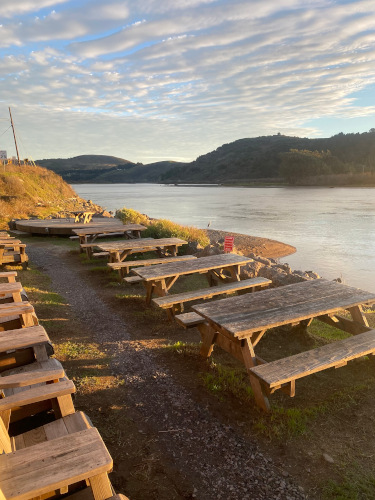
It’s a power spot.
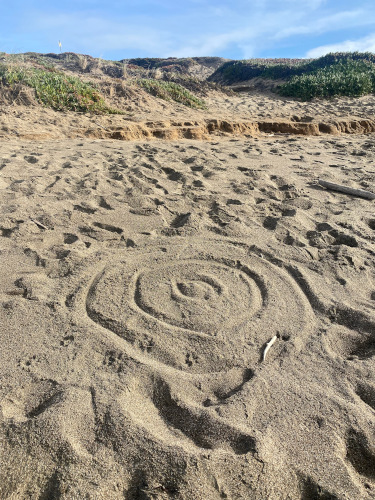
There is nothing in this world, nothing you have done, and nothing that has been done to you, nothing that you failed to do or that you did not receive, that could ever threaten or take away your inherent worthiness, your fundamental belonging to this world.
—Clementine Morrigan, “Whatever It Is, You Can Face It”
Who’s this with us?
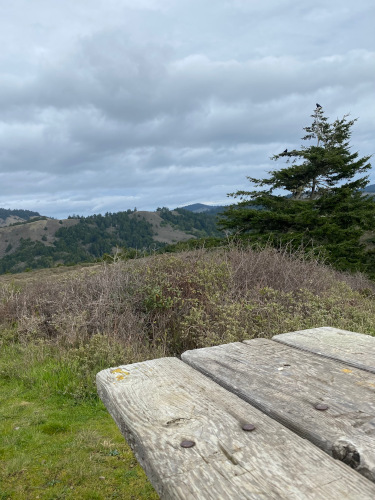
Ravens!
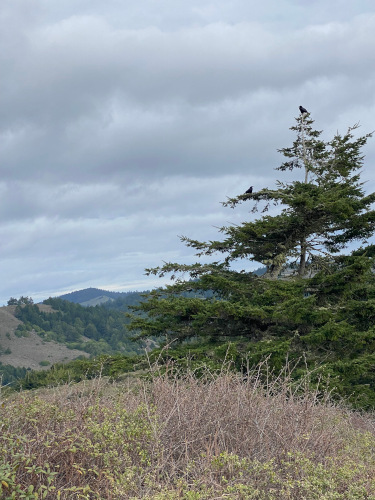
And they’re in love.
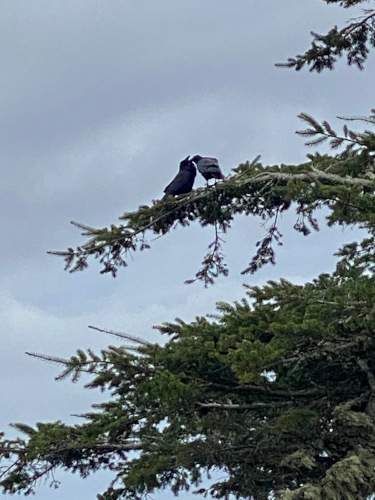
Just as crows and ravens quickly let each other know which of the humans around are kind and unkind, word seems to get around to gods, too.
Not long then, and you become what my dear departed druid friend Judith O’Grady called ‘the gods-bothered.’ You bothered, so they bothered, and then it’s all bothering from then on out, though of course it’s never really a bother, at all. It’s actually quite a joy . . . .
—Rhyd Wildermuth, “Worlding into the Earth”
It’s portals all the way through.
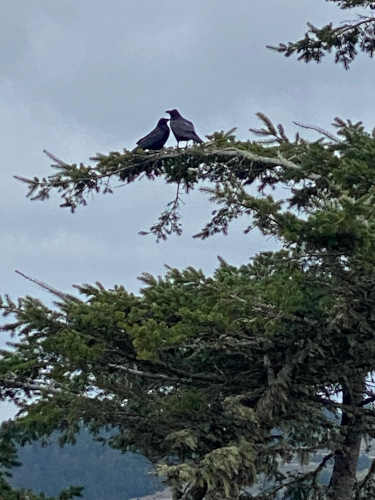
In my youth I was sad indeed, and all things seemed dark and distant.
Today, all is radiant and near, and for this I would live my youth and the pain of my youth, again and yet again.
—Kahlil Gibran, “Youth and Age”
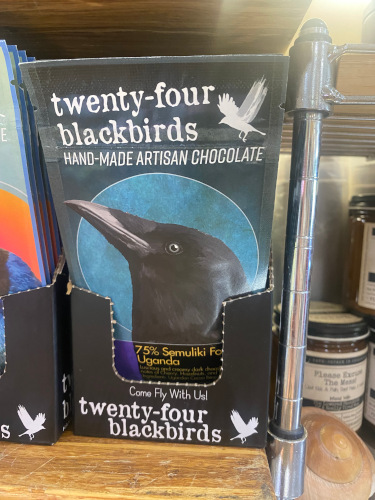
And so we must go.
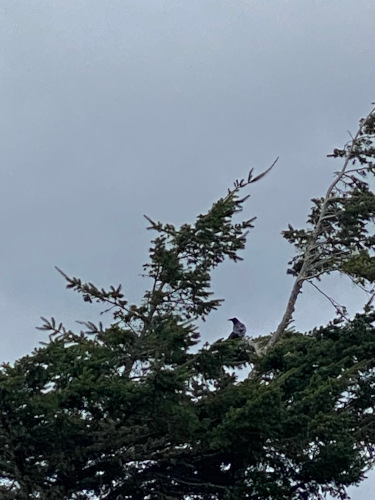
If I were religious, I would believe I met an angel. (I’m pretty spiritual, I’d say. I believe in something.)
—Alison Tyler, “What I Am.”
We have more love to explore.
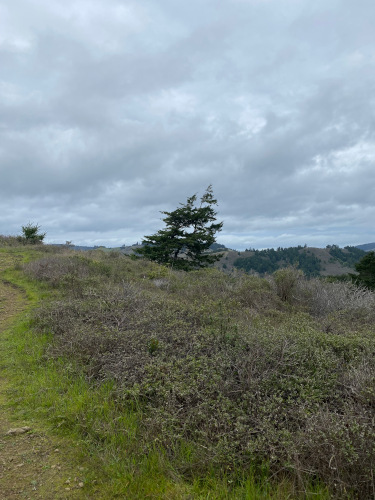
“. . . Listen, of course you’re nervous but here’s the deal: you’re ready for all the bad stuff. You’ve been very tired before. You’ve been in pain before. You’ve been worried about money before. You’ve felt like an incapable moron before. So you’ll be fine with the difficult parts! You’re already a pro. What you're NOT ready for is the wonderful parts. NOTHING can prepare you for how amazing this will be. There is no practice for that.”
—Rob Delaney, A Heart That Works
We cross the bridge when we get to it.
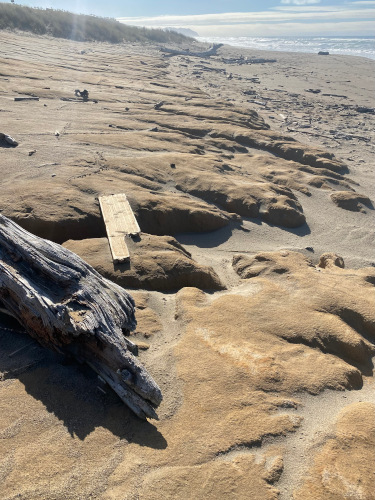
Not anyone who says, “I’m going to be
careful and smart in matters of love,”
who says, “I’m going to choose slowly,”
but only those lovers who didn’t choose at all
but were, as it were, chosen
by something invisible and powerful and uncontrollable
and beautiful and possibly even
unsuitable—
only those know what I’m talking about
in this talking about love.
—Mary Oliver
I slip and fall in poison-oak water, but it’s okay.
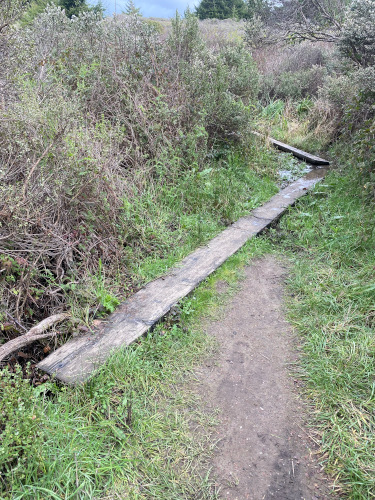
It gives me something to remember the magic by.
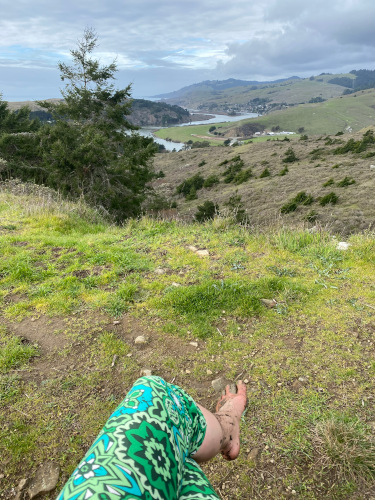
Thus the bridge burns but is not consumed.
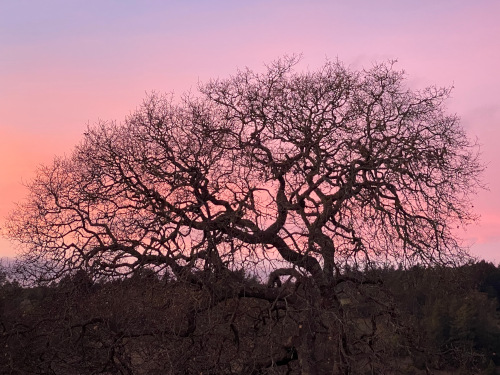
We see red.
With my most recent bout of poison oak, I thought about how suffering seemed more powerful than joy, because while one part of my body is suffering, no matter how good another part might be treated, the suffering sucks most of my attention. Your story of the man and the dog tells me how good wins, though. It's not about defeating suffering head on in a power struggle but about how one little moment of beauty in the midst of ugliness shines extra bright.
Like yesterday: I was leaving a parking lot of strip malls after having been harangued (for the second time that day) by someone who turned into my parking aisle after I was already half-backed out, presumably because I should have anticipated that someone might turn in, and therefore remained in my parking spot forever . . . ? My thoughts were naturally waxing grim. Just then, as l waited in a line of cars at a stoplight next to a gas station, a little miller-moth swirled up from somewhere in my car, made a spiral in front of me, and then vanished. It lit me up in such an incongruous way that it left a bright, invisible lingering mothglow.
—My comment to Alison Tyler on her post, “What I Am.”
What on Earth . . . ? I’ve seen this red before!
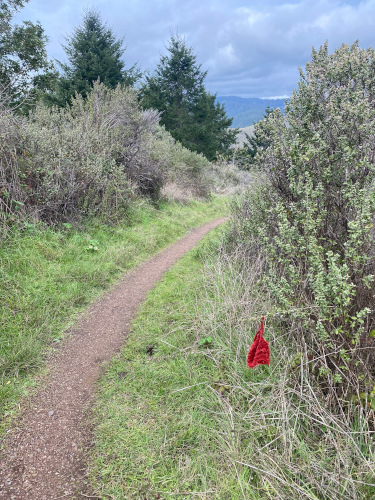
It’s a Podbelt cover I lost months ago! This is nuts!
I long since knitted another one.
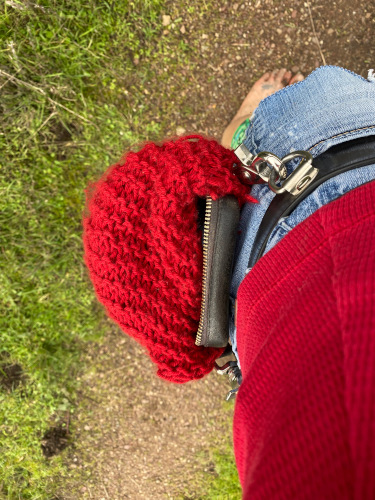
Now they can be together, the more magical for the extra adventure.
The thing you have to remember is that human beings are kind. Beneath it all, past all the terrible structures we’ve built to subsidize cruelty, away from the force of social pressure and the insecurity that always prompts our wounded aggression, people are kind. Not always, not to everyone, I know, I know, I know. But the human heart wants to be kind; it takes all the weight of our immense pathologies to render it cruel. It’s true though that people are only ever kind when they can apprehend the real human before them. . . . The kids in school when I was young, though, were mostly kind. I tell you true, they were kind. And the handful that were cruel in middle school mostly grew to become my friends as we got older. What could be a better outcome? . . .
I feel like our culture constantly suborns a wounded attachment to outsider status, teaches our young people that hanging onto resentment is a form of integrity, but it’s healthier and wiser to look for all the ways people are reaching out to you, even in the depths of your alienation. I will always remember that people were kind to me, in elementary school and high school and college and beyond.
They had to be kind because I was fucked up.
—Freddie deBoer, “weird”
This one’s had an adventure, too. Do their people miss them?
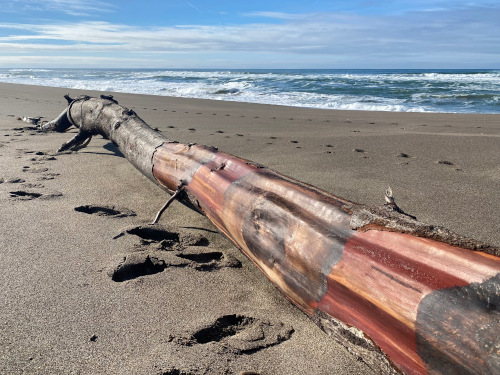
Did they leave seeds or nuts behind?
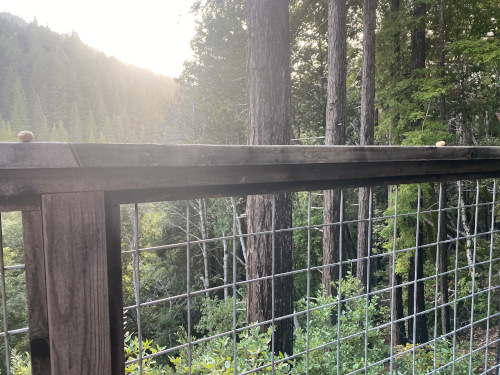
You’re a nut.
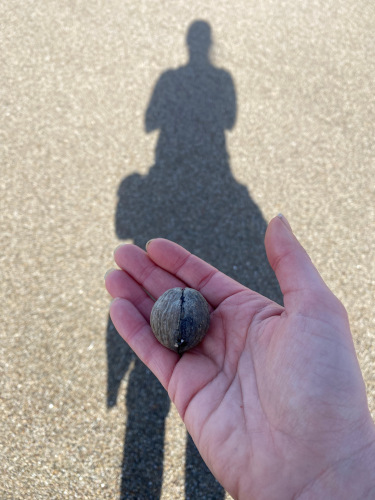
From a bumper crop.
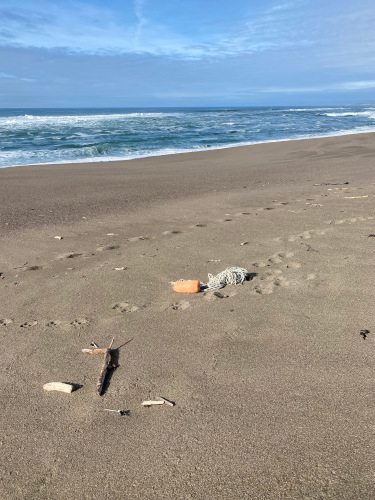
Like a fever, insanity is not a state that can go on indefinitely. It is dangerous and it can kill us. But the thing it is trying to heal, while perhaps subtle and insidious and hidden and denied, is also dangerous and could also kill us. The thing that people don’t understand is that people don’t go crazy if there is any better choice. We go crazy because we have to, because the alternative is worse.
I want us to welcome back the crazy parts of ourselves, to find them and return them to their place in our wholeness, to rescue them from exile and finally recognize and express gratitude for their brilliance.
—Clementine Morrigan, “Ambassador of the Underworld”
Hallo, what’s this?
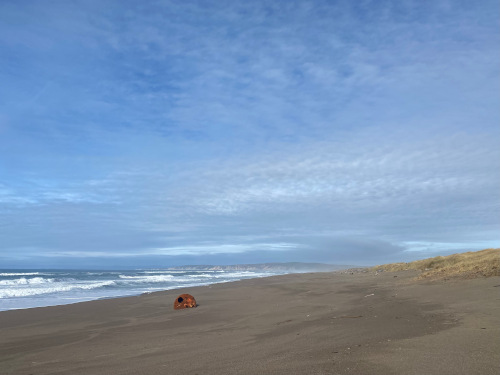
Whatever it is, it’s big and old.
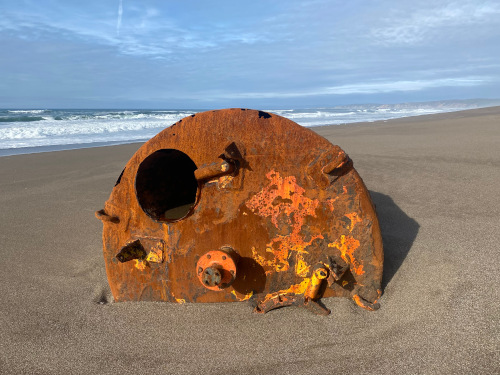
What I saw took me to my knees. I’ve never been so undone by anything as I was by the sight of Meg’s face at what I guess was around seventy-five years old. “I know this woman,” I gasped. “I know her.” She was so stunning I couldn’t stop kissing the screen. I pressed my lips to the lifelines of her wrinkles, the garden of her silver hair. Every age spot was a lucky penny falling into the wishing well of my chest. “I love her, I love her, I love her!” I kept crying, and only then did I realize how much I’d feared the possibility of never laying eyes on that version of my love. I traced my finger through the valleys of her laugh lines, and felt a peace unlike anything I’d ever experienced. A peace that seemed wildly incongruent with the news we’d just received. A peace that made no sense to me, until I found its source.
Let me try to explain. Never in my life had I seen myself so clearly as I did when I saw Meg like that. No photo had ever captured me with more exacting detail than a photo of Meg old. I had never felt so infinite, so unsinkable, so buoyed by love. I could see myself living in Meg’s eyes. I could see my spirit in the shyness of her smile. I could see that we were still together and always would be, whether I had a body of my own or not. And in seeing that, I understood anew that I could not die. None of us can. We live on in each other. We are each other already.
. . . Staring into my own ancient eyes, I knew that every wrinkle on my face had the name of someone I loved. I have so many wrinkles, I thought, because I have loved so many people.
—Andrea Gibson, “The Surprising Gift of the ‘Old Age’ Filter”
It has sand in its eye.
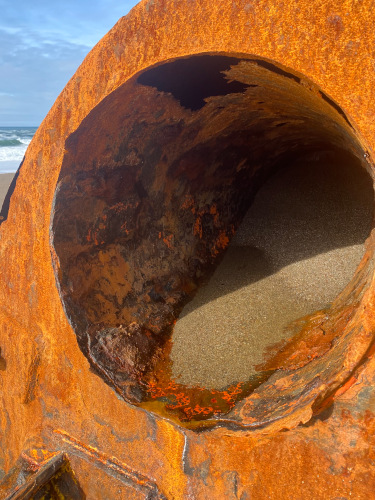
I think we’ll let it be.
There it shall remain.
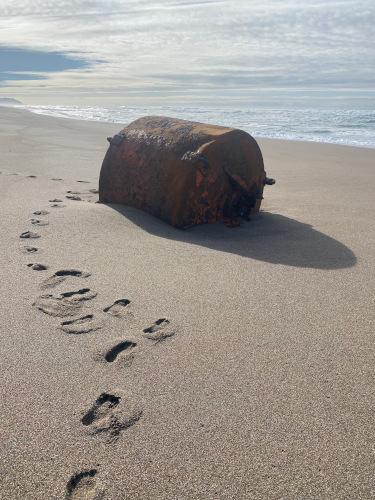
. . . What an orange thing, though!

(It’s hard to let go.)
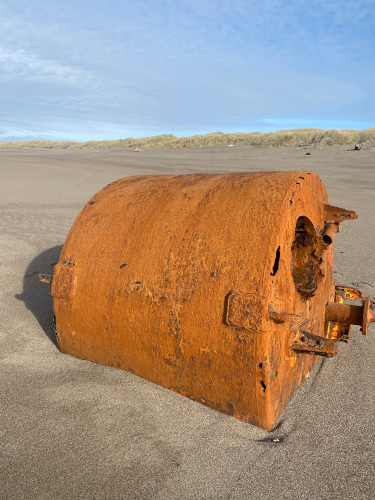
I mean, what do you think that is for?
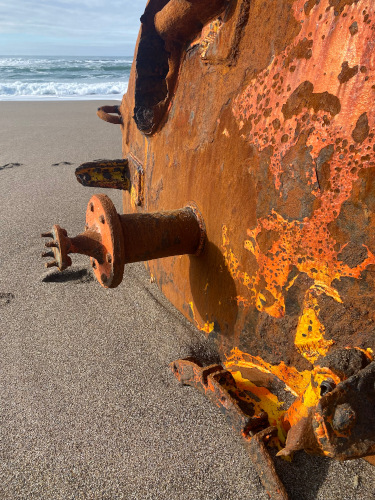
Worlds stick out of worlds.
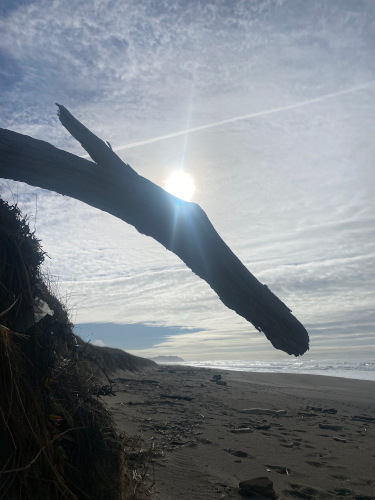
Incidentally, a dragon bit my heel, telling me to take it slow.
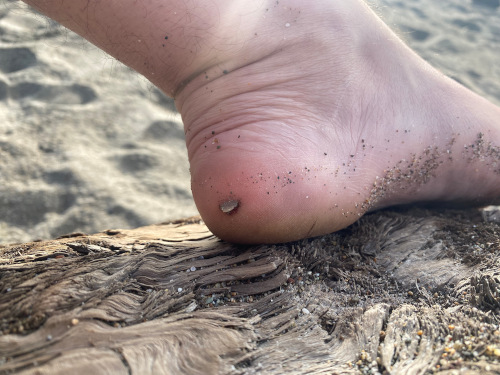
It hurts worse than it looks.
I did think, let’s go about this slowly.
This is important. This should take
some really deep thought. We should take
small thoughtful steps.
But, bless us, we didn’t.
—Mary Oliver
Things stick out for a reason. This dragon is telling us something, too.
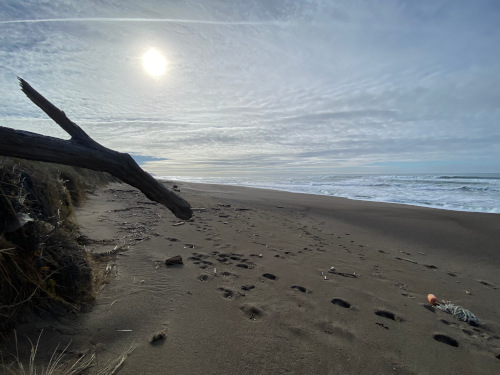
Ah yes, we’ll take this smaller orange thing as a memento and protect the beach from its disintegration—as Paddy here should have done.
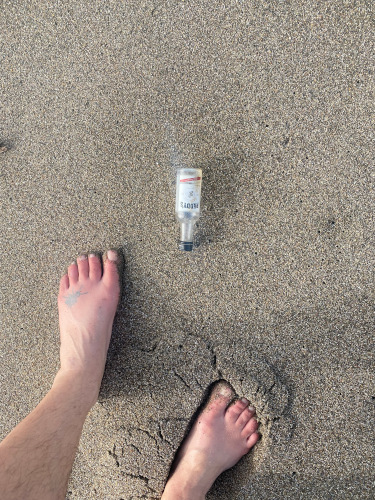
Not to worry, Paddy; we’ll take you, too. True justice is forgiveness—while protecting what one loves and righting the wrongs. It is just us, after all.
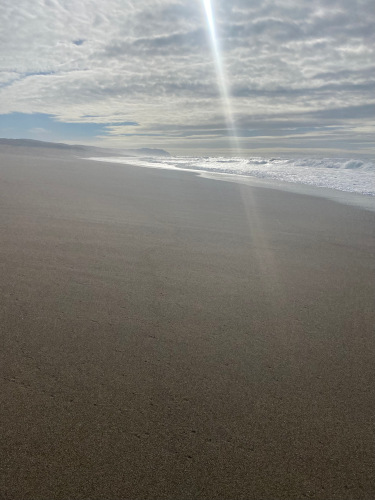
There, in that wilderness so anciently unchanged it might have seen a hundred cultures flower and die, there you realize—you must—that what is you, what feels and fears and hungers and exalts, is ancient as the wilderness itself, rich as the wilderness and kin to it.
—Rockwell Kent, Wilderness
And it’s that.

And that.
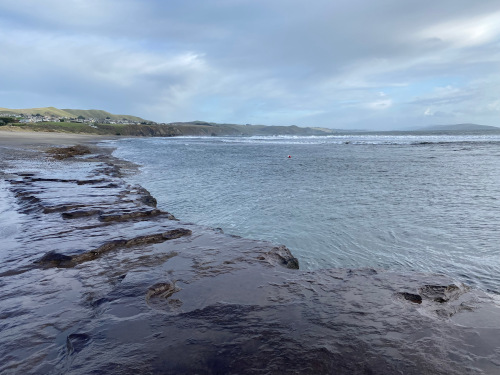
So close.
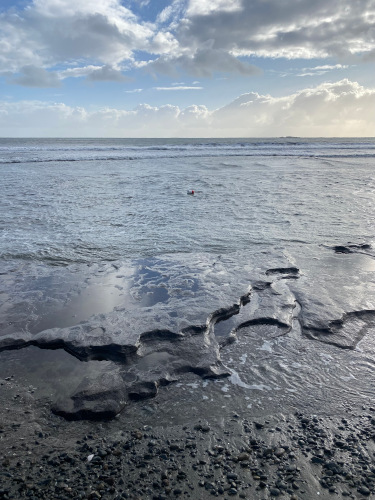
If I weren’t fully dressed, and if the weather weren’t so chilly, we’d have a new friend.
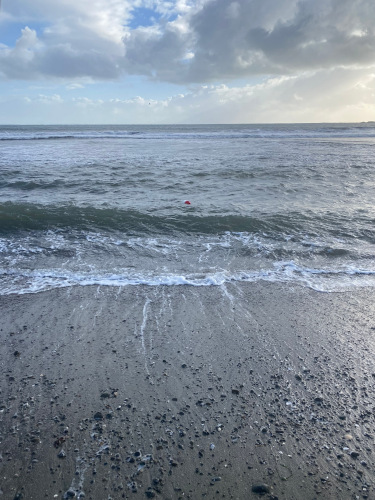
We wait for Patrick for a while.
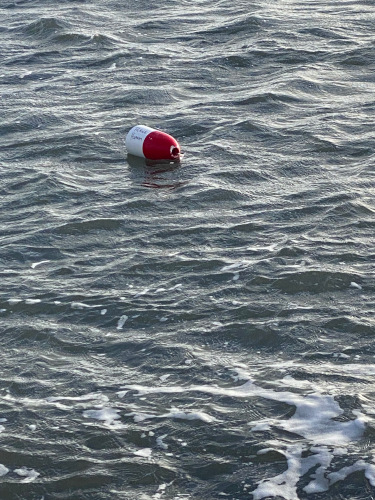
He never comes in.
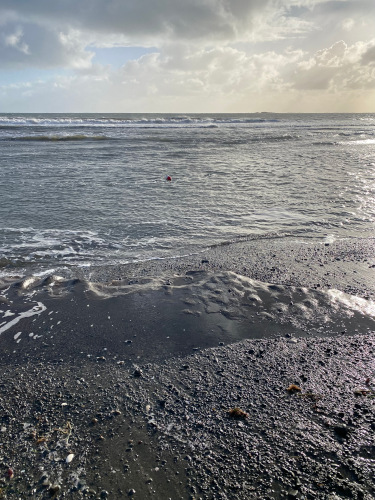
Goodbye, Patrick.
We often learn a great deal, and embark on powerful journeys, on quests for things we perceive ourselves as lacking. There is an element of the Holy Grail to this: we may never find the Grail, but a huge transformation occurs along the way.
—Imelda Almqvist, “Spiritual Narcissism—Part 2”
The way ahead beckons.
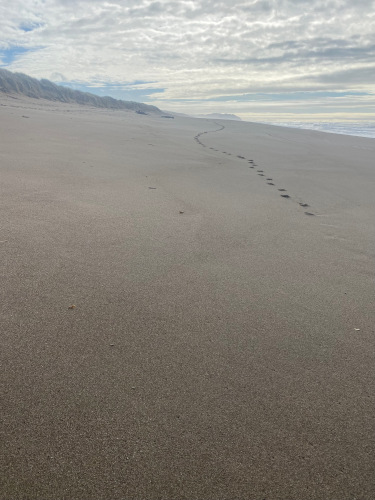
We must go on.
These are the times in life—when nothing happens—but in quietness the soul expands.
—Rockwell Kent, Wilderness
